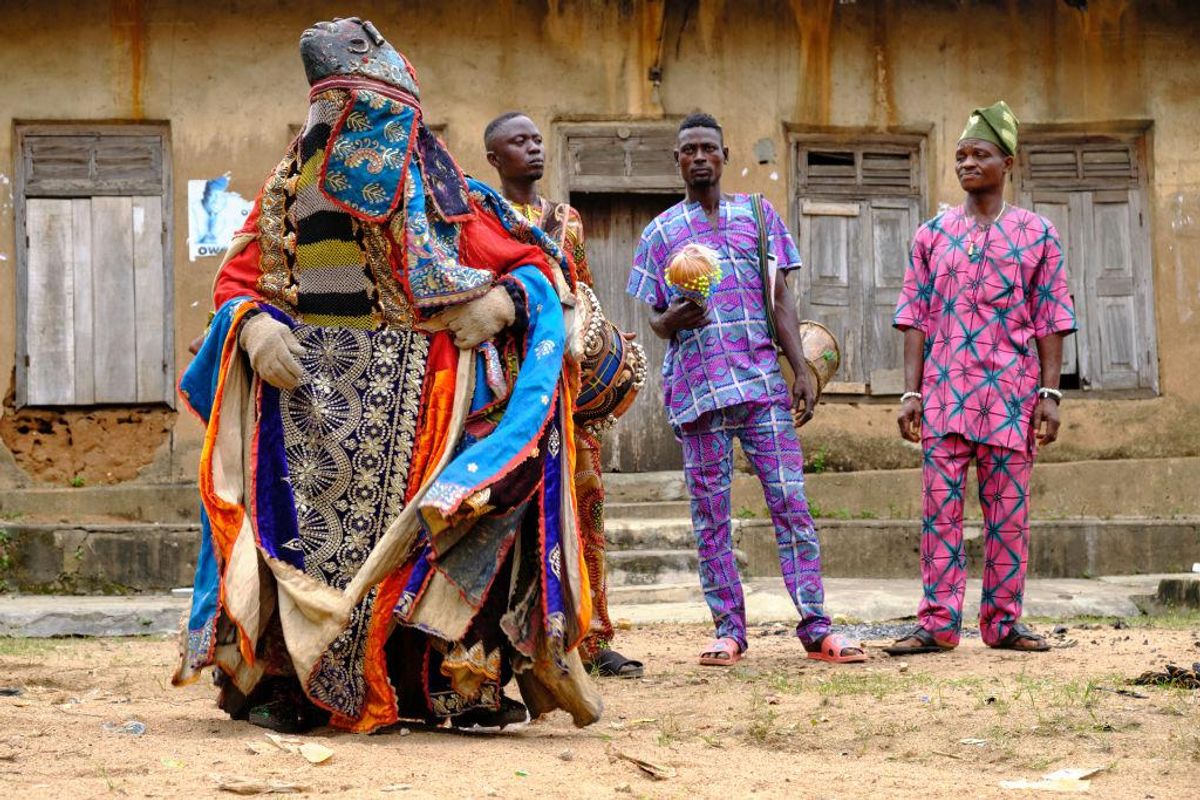British Fashion House Disastrously Attempts to Trademark 'Yoruba'
Timbuktu, a British outdoor clothing brand, has recently caused quite the stir after it was revealed that it attempted to trademark the term 'Yoruba' back in 2015.

ABEOKUTA, OGUN, NIGERIA - 2019/11/02: Man dressed with an Egungun mask performing during a ritual dance. The Egungun is a Yoruba character that represents the ancestors in the religious celebrations.
In the latest episode of cultural appropriation, British fashion house, Timbuktu, has caused outrage after it was revealed that the company had filed to trademark the term "Yoruba" — a distinct Nigerian tribe — back in 2015 at the UK's Intellectual Property Office. The revelation was made after Gbemisola Isimi, the founder of a cultural centre in London, attempted to trademark the phrase "Yoruba Stars" but was challenged by Timbuktu on the basis of similarity as they had already registered "Yoruba".
READ: 8 Recent Times Luxury Fashion Brands Used African Designs Without Including Africans
Describing their surprise at Timbuktu's attempt to trademark a term that already belongs to an entire people, Isimi shared a post on Instagram which read: "I thought it was really strange that a company would be allowed to trademark the word 'Yoruba', a tribe and language of millions of people." She went on to add that: "They even claim on their website that "to many, Timbuktu is a fictional location which literally means "the middle of nowhere", a location that has intrigued mankind for centuries". Last time I checked Timbuktu is a city in Mali, Africa!"
According to CNN, Timbuktu did not respond to their request for comment although Isimi has since confirmed that the challenge to her trademark for "Yoruba Stars" has been withdrawn. Additionally, Nile Post reportsthatthe UK's Intellectual Property Office, where Timbuktu's trademark was filed, highlighted that the public is free to challenge the "validity" of existing laws around trademarks.
Cultural appropriation is nothing new and so long as the remnants of colonialism remain, it will continue. Western fashion has been a space where aspects of various African cultures have been showcased and popularised on many runways while the people who own those cultures are sidelined and not given credit for what rightfully belongs to and represents them.
Here are some of the reactions from social media:
On their website @TimbuktuGlobal said that \u201cTimbuktu is a fictional place\u201d \nThis is the violence of cultural appropriation, simply deciding that the history of something is irrelevant once you decide that you want it and want to profit off it. Sickening. trademarking \u2018Yoruba\u2019 https://twitter.com/culturetreetv/status/1396465018745536517\u00a0\u2026— Kelechi (@Kelechi) 1621791386
The word \u201cTimbuktu\u201d and \u201cYoruba\u201d is PATENTED BY WHITE PEOPLE— Sneachta (@Sneachta) 1621956990
The word "Hausa" for example exists in the WIPO database logged as a German trademark. It is owned by a German company and this patent is "domiciled" in the German patent and trade mark office.pic.twitter.com/tUaLxbEUxE— Elnathan John (@Elnathan John) 1621808128
- In Conversation with Laolu Senbanjo on Damien Hirst and Cultural ... ›
- Adele's Notting Hill Carnival Costume Sparks Diaspora Debate ... ›
- To Dot Or Not To Dot?: My Thoughts On The Whole 'Can African ... ›
- South Africans Call Out the Use of Blackface in Bulgarian's ... ›
- Op-Ed: Can Beyoncé Be Problematic? - OkayAfrica ›
- 8 Recent Times Luxury Fashion Brands Used African Designs ... ›
- The Best Yoruba Movies on Streaming - OkayAfrica ›

